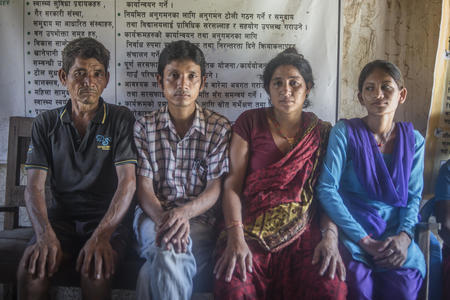Getting your period. It’s one of the most normal things in the world.
What shouldn’t be normal is having to manage your period without clean water, a decent toilet or good hygiene. Yet that’s what millions of girls and women are forced to do every single month.
And the price they’re paying couldn’t be greater. Around the world:
1 in 10 girls in Africa miss class when they have their period and go on to drop out of school.
1 in 10 girls in Africa miss class when they have their period and go on to drop out of school.
(UNESCO, 2014)
Only 23% of girls in Niger have a private place to change sanitary towels at school.
Only 23% of girls in Niger have a private place to change sanitary towels at school.
(UNICEF, 2013)
More than 1 in 5 girls in India will drop out of school when they reach puberty.
More than 1 in 5 girls in India will drop out of school when they reach puberty.
(Plan India, 2015)
When your period is considered a curse
In parts of rural Nepal, communities still practice chhaupadi – exiling girls and women to huts or sheds during their period because they’re seen as unclean.
We’re determined to change normal for girls and women when they have their period, for good.
That’s why, with your help, we’re working with our partners around the world to ensure communities have the clean water, decent toilets and good hygiene they need to safeguard their health and their dignity.
It starts with these essentials. But it leads to girls being able to stay healthy and stay in school, giving them the chance to finish their education, get a job and break the cycle of poverty their families may have been trapped in for generations.
“Most of the girls are poor, so we came up with the initiative of making reusable sanitary pads."
“Most of the girls are poor, so we came up with the initiative of making reusable sanitary pads."
In Zambia, Alice’s school now has clean water, decent toilets and sewing machines, so students can make reusable sanitary pads for themselves and their classmates.
"Before, no girls would graduate. Now up to 25% graduate from high school."
"Before, no girls would graduate. Now up to 25% graduate from high school."
In India, Luvkush began educating the boys and men in his village about menstrual health, challenging the idea girls and women were unclean during their periods.

"I can’t afford to miss class anymore. I want to pursue my dream of becoming a pilot.”
"I can’t afford to miss class anymore. I want to pursue my dream of becoming a pilot.”
In Uganda, Rachael, left, and Florence don’t have to worry about missing classes when they have their period, now they have clean water and new toilets at school.






